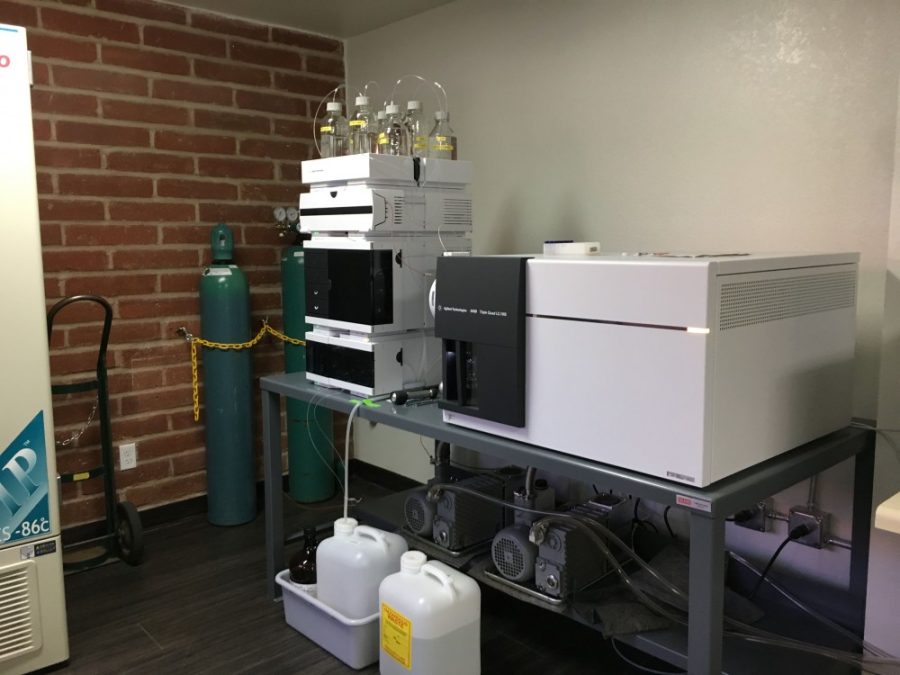Mass spectrometry is the new genomics, and Tucson is the place to be for the emerging market.
At least that’s what Nina Ossanna, vice president and co-founder of Pharos Diagnostics, thinks.
Ossanna is a three-time UA alum and worked at the university for 10 years as the business-development director for UA’s Bio5 Institute. She felt it was time for a change.
“I’ve been in transitioning tech almost all my career,” Ossanna said. “It was just time to do it myself. I want to work on projects that will get the tech in the hands of patients, doctors and vets. I love that whole process.”
Pharos Diagnostics was incorporated last April. Ossanna decided to start the lab because she and her partners, who came from the California-based LCMS Laboratories, saw that the diagnostic market will need more precision in the future. They aim to provide that precision.
“The thing that excites me is mass spec hasn’t been widely used in this yet,” she said. “Mass specs are really sensitive. They’re the gold standard of testing.”
Mass spectrometers closely analyze different chemicals by producing charged particles from the chemical and then measuring the mass using electric and magnetic fields. The unique mass measurement can be used to determine what exactly the compound is.
The technology allows for the close testing of hormones and vitamins, and is much more precise than DNA testing. It also requires just a very small sample. According to Ossanna, sometimes only 10 microliters are needed, an amount smaller than an average drop.
RELATED: Four ways for undergrads to get involved in science research
She said DNA testing has many limits because it can only tell what genes potentially could do, not what’s truly happening in the moment.
“Imagine an old card catalog in the library,” Ossanna said. “You can check it and see that there are three copies of ‘Moby Dick,’ but you don’t know if they’re checked out, or lost, or in repair. It’s the same with genome testing.”
Ossana said genome testing is only more popular because the technology is already there for it.
She believes that science is driven by advances in instrumentation, and that soon, mass spectrometry instrumentation will improve as people see more uses for it.
Mark Mcconnell, a UA graduate student in the Biomedical Engineering Graduate Interdisciplinary Program, also thinks mass spectrometry technology will become more popular and more accessible in the coming years.

“Sequencing technology is going down in price, so maybe in 5-10 years it will be the same for mass spec technology,” he said.
In the long term, Ossanna would like to start testing new drugs and working with drug development.
“If you have a new drug, you have to work with the FDA to come up with endpoints to prove that the drug is safe and effective,” she said. “In clinical trials there’s a lot of testing, and for most of the new drugs the FDA requires a companion diagnostic. People haven’t explored using the mass spec for that yet.”
A companion diagnostic is a device that records information about how effective different treatments are for specific patients, according to the FDA. It can also monitor for side effects.
Pharos Diagnostics will also do confirmations for drug tests, work with clinics on hormone replacement and with veterinary offices to test for things like kidney disease in cats.
RELATED: Science around town: four Tucson events this spring
“We can test for many things at one time,” Ossanna said. “If you say ‘Here’s a list of 50 different opioids, are any of them in this person’s blood?’ We can ask for all 50 at once. There’s not another lab in town with this kind of ability.”
For that reason, the lab isn’t looking to compete with major labs that do routine blood work, but is focusing on the more specialized testing.
Mcconnell said the only potential issue he could think of with using mass spectrometry for specialized testing was the price tag.
“I’d imagine the biggest concern would be if it’s cost effective,” Mcconnell said. “If they can do it at a competitive price point, it could work well.”
Pharos bought their first mass spectrometry machine in September, and got Clinical Laboratory Improvement Amendments certification around Thanksgiving. Right now, they are up and running, but are looking to add two more machines in the future.
“There’s a lot of validation to make sure your tests are accurate,” Ossanna said.
Right now, Pharos’s goal is to “keep the rent paid and the lights on” while they get established, she said. Once they are established, she would like to start working with interns from UA, specifically the Professional Science Masters Program, as she’s on the advisory board.
“There’s a huge amount of expertise at UA,” Ossanna said. “I’d like to create more opportunities here for people who want to work in this field. Any work I can keep here in Tucson, I’d like to.
Ossanna’s reasoning for building up this industry in Tucson is simple and personal.
“I had to leave here after I graduated, and I didn’t want to,” she said.
Follow Marissa Heffernan on Twitter.









